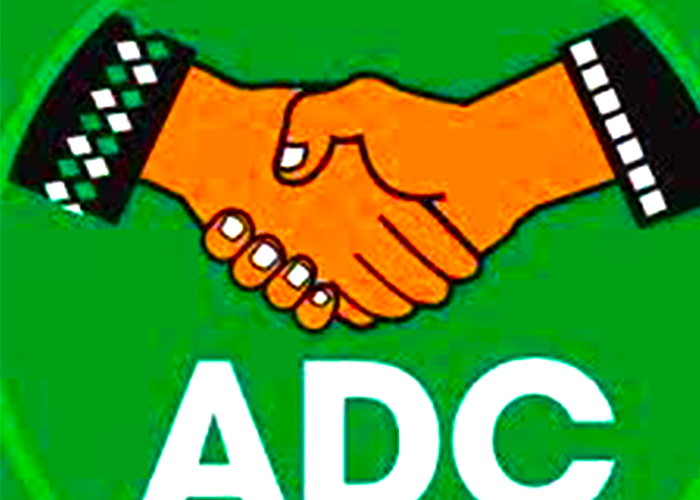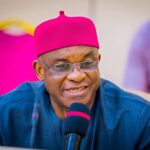Nigeria’s opposition coalition shapes up as leading figures on Tuesday unveiled a somewhat unified front ahead of the 2027 presidential poll by adopting the African Democratic Congress (ADC) as their shared political platform.
At the core of this alliance is former Senate President David Mark, who has accepted the position of Interim National Chairman of the ADC, signaling a consolidated effort to challenge President Bola Tinubu and the ruling All Progressives Congress (APC).
The announcement followed several high-level meetings, including a major assembly convened by ex-Vice President Atiku Abubakar in Abuja. The meeting was attended by senior political figures such as Peter Obi of the Labour Party, ex-governors Nasir El-Rufai and Rotimi Amaechi, along with stalwarts from the People’s Democratic Party (PDP) like Uche Secondus, Aminu Tambuwal, Liyel Imoke, and Babangida Aliyu.
According to Nigeria’s opposition coalition insiders, “We have all agreed on the ADC as the national coalition platform. So, ADC is our party, and that has been settled,” marking a decisive break from fragmented opposition structures.
David Mark has reportedly agreed to lead the ADC in the lead-up to 2027. Also former Osun Governor Rauf Aregbesola accepted his appointment as the Interim National Secretary of ADC.
Aregbesola in a statement released overnight said: “It is with deep humility, a profound sense of duty, and unwavering hope for our people, nation, race and party and that I accept the appointment as The National Secretary of our great party.”
A key motivation behind adopting ADC was its immediate readiness and registration, as coalition officials feared delays from the Independent National Electoral Commission (INEC). One source explained: “We adopted the ADC because time is no longer on our side, and INEC appears unwilling to register some of the political parties we previously proposed. The agreement is that we will all leave our various parties and move to the platform we’ve agreed upon—ADC.”
Ralph Nwosu, ADC’s current National Chairman, described David Mark as “one of the most disciplined and detribalised Nigerians,” and expressed readiness to make way for the coalition leadership. “To me, Nigeria comes first… I am ready to sacrifice for the country,” he said.
Preparations for formalizing the alliance continue, with Nigeria’s opposition coalition loyalists already being integrated into ADC’s structure. A follow-up meeting is scheduled for mid-week to finalize outstanding issues, including the National Secretary role, ahead of a public launch expected before the end of the week.
Peter Obi is reportedly supportive but has requested time to consult with stakeholders within the Labour Party before fully committing. His team indicated his willingness to float a formal announcement soon after party consultations.
Read Aregbesola’s full statement below as he accepts his appointment as ADC’s Interim National Secretary pushed forward by the Nigeria’s opposition coalition.
NIGERIA UPDATE: ACCEPTANCE SPEECH by: GOV RAUF AREGBESOLA on appointment as THE INTERIM NATIONAL SECRETARY, ADC – The party platform adopted by the National Opposition Coalition Group – Tuesday, 1st July, 2025 – PART 1 of 2
Dear Party Leaders, Distinguished Members, Friends, and Fellow Citizens,
It is with deep humility, a profound sense of duty, and unwavering hope for our people, nation, race and party and that I accept the appointment as The National Secretary of our great party.
I thank the leadership for the trust reposed in me. But more than that, I thank every committed member of this party are those who still believe that politics can be a force for good, people who believe that party forms government and must control it. Those who believe in the supremacy of the party in a democracy and all products of democratic contests. Those who recognise that parties must stand for and with the people in the promotion of their interests and aspirations. That parties therefore are not merely machines for winning elections but institutions for mobilizing, organizing, energizing, educating, empowering and encouraging the people towards their emancipation and development.
Let me begin by saying this: a political party is not a platform for opportunism. It is not a mere vehicle to power for the few, nor a tool for personal ambition. A political party, in its truest form, is a living institution built on values, guided by ideals, and accountable to the people it seeks to serve.
Throughout Africa’s history, and particularly in the legacy of the African National Congress (ANC) of South Africa; a 113 year- behemoth of party organization that is impeccable in its credibility as a model of supremacy of party over its creation (government and popularly elected officials) have seen what a party grounded in ideology, principle, and people-centered struggle can achieve. The ANC is not perfect but it stands for something. It was forged in resistance, sharpened by vision, and led by men and women who believe in justice, dignity, equality, inclusivity of all interests and true freedom. It has character. It has soul. It is therefore a true platform for the expression of their aspirations.
Sadly, in Nigeria today, we cannot say the same about many of our political parties.
Our political landscape is plagued by parties that lack ideological depth. They are empty shells merging and splitting, not over policy or principle, but over power and personality. There is little regard for the people, and even less for the country.
That is not the kind of party we must be. That is not the kind of party I will serve.
As the National Secretary, I will work to build a party that has a clear ideological compass, a party that is absolutely committed to the people, rooted in democratic values, rule of law, social justice, accountability, transparency and national development. A party that listens and works for to the people, not only during elections, but every single day.
We must become an institution where:
(1) Internal democracy is not just preached but practised.
(2) Intra-party competition is transparent, fair, and just.
(3) All party structures from the ward to the national level and function effectively and efficiently.
(4) Young people, women, and the marginalised have a real voice, not symbolic inclusion.
(5) All special and critical interests(security, educators, farmers, workers, women, youth, professionals, people with special needs, etc., must be recognised and allowed to have autonomous structures within the party.
We will model international best practices in party organisation, administration, and ethics. We will study what works from South Africa to Sweden, from Chile to Kenya, and adapt what fits our local reality. Discipline, order, clarity of purpose, and service to the people must define us.





